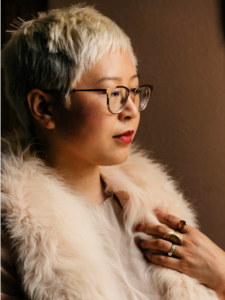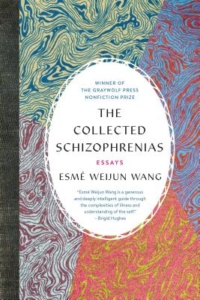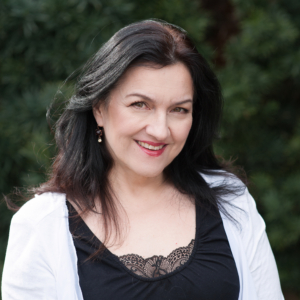 In 2019, all of my friends were reading Esmé Weijun Wang’s essay collection, The Collected Schizophrenias, at the same time. They asked if I’d seen it. A Graywolf Press enthusiast, I admitted I had it on my shelf, but hadn’t read it. “Drop everything you’re doing and read it!” one of my best writer-friends said. I was in the middle of a tough MFA project period, but I picked up the book and began.
In 2019, all of my friends were reading Esmé Weijun Wang’s essay collection, The Collected Schizophrenias, at the same time. They asked if I’d seen it. A Graywolf Press enthusiast, I admitted I had it on my shelf, but hadn’t read it. “Drop everything you’re doing and read it!” one of my best writer-friends said. I was in the middle of a tough MFA project period, but I picked up the book and began.
I started reading on a Thursday night, and by the time the clock struck two a.m., I realized I couldn’t stay up all night. I had to drive two hours in the morning, in order to pick up my grandkids and play. My solution was to buy the Audible selection, so I could listen to Wang read her essays where I’d left off.
The Collected Schizophrenias is hypnotic, poetic, and scary-beautiful. The reader follows Wang through a jungle of obstacles, a precarious tight-rope over the falls, and endures first-hand accounts of living with schizoaffective disorder and Lyme disease. Wang’s authorial power is found in the way she guides us through, as if she knows why we are with her. We’re all searching for hope, looking for the way out, or the way through. I was personally hypnotized because someone very close to me had been walking a similar path.
After I devoured The Collected Schizophrenias, I had lunch with my friend who recommended it. She promptly gifted me with her copy of Wang’s delicious debut novel, The Border of Paradise, which proved to be as bingeworthy as Wang’s essays. One fictional phrase reminded me of an essay, and I ended up reading both books together again, like twin sisters. The Border of Paradise is as good as modern fiction gets—it was named a Best Book of 2016 by NPR—and The Collected Schizophrenias was an instant New York Times bestseller. Both books show the incredible range of an author who has devoted her life to honing her craft, despite any physical setbacks she’s had to endure.
When I sat down with Wang at the December 2019 residency, Wang had just signed a major two-book deal with Riverhead Books, an imprint of Penguin Random House. The two books Wang will produce are also fiction and nonfiction, like the ones I had just finished. We started talking about the difference between writing fiction and nonfiction, why ordinary index cards are so important, and the upcoming projects on which she’s excited to work. I told her the story of my friends, who all guided me toward her books, which brought so much healing to our family. She was genuine, graceful, and down to earth, even as we discussed her new book deal.
Janet Rodriguez: Congratulations on your two-book deal with Riverhead! How do you feel about this? Do you feel like it happened all at once?
Esmé Weijun Wang: No. [Smiles] It feels like it took a really long time! I mean, that novel [The Border of Paradise] was rejected forty-one times. This book, The Collected Schizophrenias, almost wasn’t published. That’s another story I can tell, as well. Both of my books were published by the skin of my teeth, so this year has felt like such a banner year in so many ways, but it also hasn’t happened by accident. I do feel incredibly fortunate, but it has taken a long time.
JR: In your seminar, you said you never saw yourself as a writer of the personal essay. Isn’t it strange, since The Collected Schizophrenias is your masterpiece, so to speak? Do you feel like you’ve become an unintentional writer of the personal essay?
EWW: [Laughs] It’s funny, because for about 95% of the book tour for The Collected Schizophrenias, I said I wasn’t going to write another book of nonfiction, and I just announced that I’m writing another book of nonfiction! So, I think I may have doomed myself to be a writer of both for the foreseeable future. [Laughs] I’m joking, of course. There is something wonderful about being able to write both, as I mentioned in my seminar. It does take different kinds of brain work, which is really enjoyable. When I spent all that time working on The Collected Schizophrenias, I really missed writing fiction, and I particularly missed writing novels. I did write a short story [“What a Terrible Thing it Was” originally published in Granta magazine], that was in the 2018 collection of The Best American Short Stories. I started working on Soft Animals, the book that is forthcoming from Riverhead, when I was touring this year for The Collected Schizophrenias. I was so eager to work on fiction again!
JR: Congratulations. Riverhead is a beautiful house.
EWW: Thank you—I’m really excited, and I’m just now starting to feel that I can start making a living at something I really love to do.
JR: And you’re good at it!
EWW: Thank you!
JR: Do you have a background in poetry? Because your work is very lyrical and gorgeous. It feels almost metered.
EWW: Thank you, but no. I love poetry and I do care a lot about prose and prosody, but I’m a horrible poet. I did take one poetry writing class during my MFA writing program, but I cannot write poetry to save my life!
JR: Your new book of nonfiction is called The Unexpected Shape, exploring the balance between ambition and limitations in contemporary life. Your website says that you live by creativity, resilience, and legacy. How does that work to balance limitations with ambition?
EWW: The phrase The Unexpected Shape is one I happened upon because our lives are not always the way we think they’re going to be. They often come to us in a shape that we’re not expecting. I often talk about being ambitious and living with limitations. An analogy I use is from an academic writer I came across named Peter North, who talks about limitations being like the outline of a baseball diamond. Without the outlines, which are frustrating, there would be no game. You can’t run from first base to home—even though that would be kind of a fun way to score [laughs]—because that’s not how baseball works. It’s kind of like the limitations in our lives. Living with chronic illness is not my preferred way of living, but it is the shape that my life has taken. I kind of think of it as having provided the boundaries of my life. In some ways, it is the “game” that is my life right now.
JR: For an ambitious person to recognize limitations? That’s a hard thing.
EWW: It is incredibly hard. For me, it was the hardest when I first became physically ill. I’ve lived with some form of mental illness for quite a long time, probably since I was a small child, but when I became really physically ill, that was when I had to deal with something that I never really dealt with before. I was used to pushing my body in all kinds of ways. I was drinking so much caffeine that I used to throw up, sometimes as much as three times a day. I was used to being caffeine sick. I would do it because I was used to abusing my body. I did this just to get work done or write for ten hours a day. When I first became sick with this mysterious ailment, that was diagnosed as many things, I realized I had to slow down. I had to learn work-arounds, otherwise I would never be able to live. I would never be able to even attempt the ambitious things I wanted to.
JR: In The Collected Schizophrenias, you say, “I call the author of The Border of Paradise a woman who was mostly well,” which says so much about your health in the book. Do you believe you were in a good place when your novel was written?
EWW: I believe I was so much more well, physically, when I was writing The Border of Paradise. I was not particularly mentally well, necessarily, but I was much more physically well. With The Collected Schizophrenias, I was recovering, and for parts of it I was fairly psychotic. I was not physically well. I wrote the majority of it while lying in bed on my iPhone or on an iPad. 
JR: But I want to thank you for that book. What you’ve done for all of us! You write with such candor. Even in the art community, we don’t talk about it and that’s sad because so many of us suffer silently. How did you get that wisdom to slow down?
EWW: I think a lot of it came the hard way. I certainly learned things from different sources. I have a therapist who specializes in working with chronically ill people. I read a lot of books about suffering, which is something that I think a lot of chronically ill people end up doing. There are certain books that I realize a lot of chronically ill people tend to gravitate towards, such as Thich Nhat Hanh’s No Mud, No Lotus or Viktor Frankl’s memoir, Man’s Search for Meaning. There are books about suffering that can be helpful. Even though it is part of life to suffer—in Buddhism, they say suffering is an inherent part of life—humans are actually not really good at suffering. We like to think that things will be great all the time, or that we will never encounter horrible life experiences, or we can avoid horrible life experiences if we just try hard enough…
JR: Or if we make the right decisions or choose the right roads…
EWW: Yes. So, it was a really tough few years. As I was learning the work-arounds and the lessons about suffering, I also became more well. I don’t think this is a coincidence, either. I’ve been learning to live with illness as my body is fighting the illness less. I had a seminar to teach here today, at Antioch, and I’ve been awake since three in the morning because I had a lot of pain and couldn’t sleep. I started worrying that I wasn’t going to be able to teach this seminar. That’s just part of being chronically ill, too: not knowing you would be able to hold up your end of the bargain when you’ve agreed to things. I am much more able to keep appointments and do the things I promised than I was two years ago, but it’s still something that really frightens me and worries me.
JR: Because you are driven?
EWW: Because I’m driven and because I don’t like to let people down.
JR: Suffering is seen as a tenet of many faiths and, in nature, it’s part of the deal. There are spiritual disciplines that define suffering as noble. If you endure suffering, you become more noble.
EWW: Oh, yeah. I went to one Catholic church in Chimayo. They had some of the most graphic depictions of Christ on the cross. There was like blood and it was really gruesome. Yeah! I am really looking forward to working on that book because I think a lot of people can relate to it.
JR: I loved the indexing class you did, Indexing as Creative Discovery! I see myself as a fiction writer, so I find myself struggling to organize the CNF project I’m working on now. How long have you been organizing your work like this?
EWW: Basically, since I started writing nonfiction. I realized I would have to have a new way of doing nonfiction if I was going to do nonfiction. I would have to have some way of telling my brain, “You are doing a different thing now.” I mentioned during the seminar of how I have lunch with other writers and they say, “I sit down and write a thing…” and I just can’t do that. I need to know what I’m doing when I sit down. So, working with index cards is the way I can flip the nonfiction switch in my brain.
There is something wonderful about being able to write both fiction and nonfiction…. It does take
different kinds of brain work, which is really enjoyable.
JR: In your seminar, you said that index cards are a big part of your process. Do you mind retelling the story you shared, about the dream you had about organization?
EWW: Oh, yeah! It actually happened one night when I couldn’t fall asleep, and suddenly, the title for the new nonfiction book floated into my head. It was the name of my blog that I had been using for a while, but I started thinking, “What if I use this title for a new essay collection?” So, I thought I’d just jot that down on my notes in my phone. Then I thought, “I should go to the other room, because I don’t want to wake up my husband.” Then I went to the other room and I started thinking, “Well, I think I have the three sections of the book,” and I started typing that into my notes. Once I had that, the four essays for each section just kind of floated into my head.
The next morning, I typed out an entire document of the title, the three sections and the titles for the four essays for each section. I sent this document off to my agent. She wrote me back and said, “What is this? Let’s have a call.” So, we had a call and I explained to her what I thought the new nonfiction book would be: another collection of essays about ambition and living with limitations in contemporary life. After I finished describing each essay and the book as a whole, she said: “Write down everything you just told me and send me the document.” So, I did. It turned out that the one book we were trying to shop became a two-book package we were trying to shop. That organization was definitely a supernatural occurrence!
JR: It definitely sounds supernatural! On the way to your seminar, my friend and I were talking about Isabel Allende’s House of Spirits, a novel about supernatural occurrences in real life. We ended up in your seminar, listening to that story!
EWW: Yeah, that kind of thing doesn’t happen every day.
JR: When you were an MFA student, did anyone teach you how to organize your work? Using index cards, like you showed us?
EWW: (Laughs) No…
JR: Should programs focus on things like this? The organizational part of writing?
EWW: You know, when I first started teaching the index card thing in various MFA programs or places that teach creative writing, I got really worried when they would ask, “Can you turn in your workshop description?” I felt like this was too practical and not esoteric enough. Then, it seemed like people really liked it because it was practical. I thought, “There are enough esoteric people to balance me out. So now I can let the other people be esoteric and I can do a practical thing. I ended up feeling, when I was in my MFA program, that basically no one taught me anything practical. There are practical things students need to know, like figuring out your money as a writer, or marketing as a writer, or querying agents. Writers need to be able to figure out practical things as well.
JR: If you could give advice to a writer, or to an MFA student, what advice would you give them? What do you wish someone would have told you? Or that you wish you heard?
EWW: I feel like there is so much I wish I could have learned. There is something that I heard a lot during my MFA, but it didn’t really sink in, and I wish it did. It was something that Peter Ho Davies, a professor at the University of Michigan, said: “Literature is not a sack race.” I heard it, but it didn’t really sink in for me and I wish it had. Being part of a peer group that was, in some ways, very competitive, I kept feeling like I needed to be in a rush. I felt like I sometimes thought that I wasn’t getting anywhere fast enough, or writing fast enough, or that I wasn’t publishing fast enough. I had to remember that literature is not a sack race. I think remembering that is important. Literature is not a sack race.
JR: Thank you for everything! What a joy to have you here!
EWW: Thank you so much for having me!
Janet Rodriguez is an author, teacher, and editor living in Northern California. In the United States, her work has most recently appeared in Eclectica, The Rumpus, Cloud Women’s Quarterly, Salon.com, American River Review, and Calaveras Station. She is the winner of the Bazzanella Literary Award for Short Fiction and the Literary Insight for Work in Translation Award, both from CSU Sacramento in 2017. Currently, she is a Cardinal MFA candidate at Antioch University, Los Angeles, where she serves Lunch Ticket as Managing Editor.





